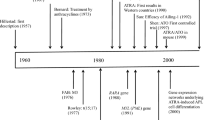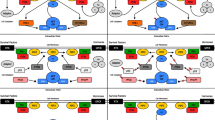Abstract
Exposure of acute promyelocytic leukemia (APL) cells to all-trans retinoic acid (ATRA) increases levels of Mcl-1, however, the implication of ATRA-mediated expressions of Mcl-1 in these cells remains to be fully elucidated. This study found that exposure of NB4 and PL-21 cells to ATRA increased levels of Mcl-1 in association with phosphorylation of c-jun N-terminus kinases. Down-regulation of Mcl-1 by a small interfering (siRNA) or an inhibitor of JNK significantly potentiated the ability of ATRA to induce differentiation and apoptosis in these cells. On the other hand, the anti-leukemia effects of ATRA were blunted when Mcl-1 was forced expressed in NB4 and PL-21 cells as well as leukemia cells isolated from individuals with APL. Furthermore, down-regulation of Mcl-1 by an siRNA sensitized non-APL U937 and KG-1 leukemia cells to ATRA-mediated differentiation and apoptosis. Taken together, inhibition of Mcl-1 might be useful to potentiate the action of ATRA in APL as well as non-APL AML cells.








Similar content being viewed by others
References
Grimwade D, Walker H, Harrison G et al (2001) The predictive value of hierarchical cytogenetic classification in older adults with acute myeloid leukemia (AML): analysis of 1065 patients entered into the United Kingdom Medical Research Council AML11 trial. Blood 98:1312–1320
Grignani F, De Matteis S, Nervi C et al (1998) Fusion proteins of the retinoic acid receptor-alpha recruit histone deacetylase in promyelocytic leukaemia. Nature 391:815–818
Kizaki M, Dawson MI, Heyman R et al (1996) Effects of novel retinoid X receptor-selective ligands on myeloid leukemia differentiation and proliferation in vitro. Blood 87:1977–1984
Gombart AF, Koeffler HP (2002) Neutrophil specific granule deficiency and mutations in the gene encoding transcription factor C/EBPε. Curr Opin Hematol 9:36–42
Soignet SL, Maslak P, Wang ZG et al (1998) Complete remission after treatment of acute promyelocytic leukemia with arsenic trioxide. N Engl J Med 339:1341–1348
Wolf G, Smas CM (2000) Retinoic acid induces the degradation of the leukemogenic protein encoded by the promyelocytic leukemia gene fused to the retinoic acid receptor alpha gene. Nutr Rev 58:211–214
Kozopas KM, Yang T, Buchan HL, Zhou P, Craig RW (1993) MCL1, a gene expressed in programmed myeloid cell differentiation, has sequence similarity to bcl-2. Proc Natl Acad Sci USA 90:3516–3520
Yang T, Kozopas KM, Craig RW (1995) The intracellular distribution and pattern of expression of Mcl-1 overlap with, but are not identical to, those of Bcl-2. J Cell Biol 128:1173–1184
Opferman J, Iwasaki H, Ong CC et al (2005) Obligate role of anti-apoptotic MCL-1 in the survival of hematopoietic stem cells. Science 307:1101–1104
Campbell CJ, Lee JB, Levadoux-Martin M et al (2010) The human stem cell hierarchy is defined by a functional dependence on Mcl-1 for self-renewal capacity. Blood 116:1433–1442
Zhang B, Gojo I, Fenton RG (2002) Myeloid cell factor-1 is a critical survival factor for multiple myeloma. Blood 99:1885–1893
Kaufmann SH, Karp JE, Svingen PA et al (1998) Elevated expression of the apoptotic regulator Mcl-1 at the time of leukemic relapse. Blood 91:991–1000
Stam RW, Den Boer ML, Schneider P et al (2010) Association of high-level MCL-1 expression with in vitro and in vivo prednisone resistance in MLL rearranged infant acute lymphoblastic leukemia. Blood 115:1018–1025
Pepper C, Lin TT, Pratt G et al (2008) Mcl-1 expression has in vitro and in vivo significance in chronic lymphocytic leukemia and is associated with other poor prognostic markers. Blood 112:3807–3817
Kitada S, Andersen J, Akar S et al (1998) Expression of apoptosis-regulating proteins in chronic lymphocytic leukemia: correlations with in vitro and in vivo chemoresponses. Blood 91:3379–3389
Zhou P, Qian L, Bieszczad CK et al (1998) Mcl-1 in transgenic mice promotes survival in a spectrum of hematopoietic cell types and immortalization in the myeloid lineage. Blood 92:3226–3239
Zhou P, Levy NB, Xie H et al (2001) MCL1 transgenic mice exhibit a high incidence of B-cell lymphoma manifested as a spectrum of histologic subtypes. Blood 97:3902–3909
Beroukhim R, Mermel C, Porter D et al (2010) The landscape of somatic copy-number alteration across human cancers. Nature 463:899–905
Xia L, Wurmbach E, Waxman S, Jing Y (2006) Upregulation of Bfl-1/A1 in leukemia cells undergoing differentiation by all-trans retinoic acid treatment attenuates chemotherapeutic agent-induced apoptosis. Leukemia 20:1009–1016
Gianni M, Peviani M, Bruck N et al (2012) p38αMAPK interacts with and inhibits RARα: suppression of the kinase enhances the therapeutic activity of retinoids in acute myeloid leukemia cells. Leukemia 26:1850–1861
Gazel A, Banno T, Walsh R, Blumenberg M (2006) Inhibition of JNK promotes differentiation of epidermal keratinocytes. J Biol Chem 281:20530–20541
Mendelson KG, Contois LR, Tevosian SG, Davis RJ, Paulson KE (1996) Independent regulation of JNK/p38 mitogen-activated protein kinases by metabolic oxidative stress in the liver. Proc Natl Acad Sci USA 93:12908–12913
Lee LF, Li G, Templeton DJ, Ting JP (1998) Paclitaxel (Taxol)-induced gene expression and cell death are both mediated by the activation of c-Jun NH2 terminal kinase (JNK/SAPK). J Biol Chem 273:28253–28260
Davis RJ (2000) Signal transduction by the JNK group of MAP kinases. Cell 103:239–252
Bubici C, Papa S, Pham CG, Zazzeroni F, Franzoso G (2004) NF-kB and JNK: an intricate affair. Cell Cycle 3:1524–1529
Sabapathy K, Wagner EF (2004) JNK2: a negative regulator of cellular proliferation. Cell Cycle 3:1520–1523
Nagata Y, Nishida E, Todokoro K (1997) Activation of JNK signaling pathway by erythropoietin, thrombopoietin, and interleukin-3. Blood 89:2664–2669
Ikezoe T, Chen SS, Yang Y, Heber D, Taguchi H, Koeffler HP (2003) PC-SPES: Molecular mechanism to induce apoptosis and down-regulate expression of PSA in LNCaP human prostate cancer cells. Int J Oncol 23:1461–1470
Yang Y, Ikezoe T, Saito T, Kobayashi M, Koeffler HP, Taguchi H (2004) Proteasome inhibitor PS-341 induces growth arrest and apoptosis of non-small cell lung cancer cells via the JNK/c-Jun/AP-1 signaling. Cancer Sci 95:176–180
Kodama Y, Taura K, Miura K, Schnabl B, Osawa Y, Brenner DA (2009) Antiapoptotic effect of c-Jun N-terminal kinase-1 through Mcl-1 stabilization in TNF-induced hepatocyte apoptosis. Gastroenterology 136:1423–1434
Kubonishi I, Machida K, Niiya K et al (1984) Establishment of a new peroxidase-positive human myeloid cell line, PL-21. Blood 63:254–259
Nishioka C, Ikezoe T, Yang J, Gery S, Koeffler HP, Yokoyama A (2009) Inhibition of mammalian target of rapamycin signaling potentiates the effects of all-trans retinoic acid to induce growth arrest and differentiation of human acute myelogenous leukemia cells. Int J Cancer 125:1710–1720
Wergeland L, Sjøholt G, Haaland I, Hovland R, Bruserud Ø, Gjertsen BT (2007) Pre-apoptotic response to therapeutic DNA damage involves protein modulation of Mcl-1, Hdm2 and Flt3 in acute myeloid leukemia cells. Mol Cancer 6:33
Soucek K, Pacherník J, Kubala L, Vondrácek J, Hofmanová J, Kozubík A (2006) Transforming growth factor-beta1 inhibits all-trans retinoic acid-induced apoptosis. Leuk Res 30:607–623
Bedi R, Du J, Sharma AK, Gomes I, Ackerman SJ (2009) Human C/EBP-epsilon activator and repressor isoforms differentially reprogram myeloid lineage commitment and differentiation. Blood 113:317–327
Theilgaard-Mönch K, Jacobsen LC, Borup R et al (2005) The transcriptional program of terminal granulocytic differentiation. Blood 105:1785–1796
Barinaga M (1996) Life-death balance within the cell. Science 274:724
De Smaele E, Zazzeroni F, Papa S et al (2001) Induction of gadd45beta by NF-kappaB downregulates pro-apoptotic JNK signalling. Nature 414:308–313
Ventura JJ, Hubner A, Zhang C, Flavell RA, Shokat KM, Davis RJ (2006) Chemical genetic analysis of the time course of signal transduction by JNK. Mol Cell 21:701–710
Wang Q, Wieder R (2004) All-trans retinoic acid potentiates Taxotere-induced cell death mediated by Jun N-terminal kinase in breast cancer cells. Oncogene 23:426–433
Huang HS, Liu ZM, Hong DY (2010) Blockage of JNK pathway enhances arsenic trioxide-induced apoptosis in human keratinocytes. Toxicol Appl Pharmacol 244:234–241
Yu C, Minemoto Y, Zhang J et al (2004) JNK suppresses apoptosis via phosphorylation of the proapoptotic Bcl-2 family protein BAD. Mol Cell 13:329–340
Acknowledgments
This work was supported in part by The Kochi University President’s Discretionary Grant (to T.I).
Conflict of interest
The authors have no conflict of interest to declare.
Author information
Authors and Affiliations
Corresponding author
Rights and permissions
About this article
Cite this article
Yang, J., Ikezoe, T., Nishioka, C. et al. Over-expression of Mcl-1 impairs the ability of ATRA to induce growth arrest and differentiation in acute promyelocytic leukemia cells. Apoptosis 18, 1403–1415 (2013). https://doi.org/10.1007/s10495-013-0872-0
Published:
Issue Date:
DOI: https://doi.org/10.1007/s10495-013-0872-0




